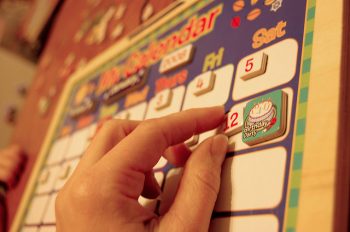The Days of the Week in Hebrew Posted by Ayana on Aug 7, 2017 in Uncategorized
The Hebrew days are numeral. Their names are count off their order: the first day of the week is called first day, the following day is called second day, and so on for the next four days. The counting includes only six days. The seventh day of the week is the only one without numeral meaning in its name. But let’s take it day by day, and start from the beginning:
Sunday – יוֹם רִאשׁוֹן
The first day of the work week in Israel is not Monday, but Sunday (יוֹם רִאשׁוֹן). רׅאשׁוֹן means first, and it’s the first day of God’s creation of the world: ‟And God called the light day, and the darkness He called night. And the evening and the morning were the first day.” (Genesis, chapter 1, 5).
Monday – יוֹם שֵׁנִי
The phrase ‟Everybody hates Monday” doesn’t ring true in Israel. As the second day of the week – יוֹם שֵׁנִי – it doesn’t bear such resentment. But יוֹם רִאשׁוֹן does. And we have a different phrase for that, a military slang actually, since no soldier likes returning to base after the weekend. Soldiers call it שְׁבׅיזוּת יוֹם א’. שְׁבׅיזוּת is a slang for depression, gloom; and יוֹם א’ means יוֹם רִאשׁוֹן. It’s originally a military slang, but it’s part of every one’s life: students, workers, anyone who doesn’t plan a trip to Vegas on יוֹם רִאשׁוֹן. I spotted two interesting articles in Hebrew, advising ways to deal with שְׁבׅיזוּת יוֹם א’: one for soldiers and one for working adults.
Tuesday – יוֹם שְׁלִישִׁי
When God created the world, He blessed His creations. For example, He blessed the light He created at the first day: ‟That it was good” (Genesis, chapter 1, 4). God blessed His creations for everyday of the week, except for יוֹם שֵׁנִי. On the third day God blessed twice: ‟And God called the dry land Earth … and God saw that it was good … And the earth brought forth grass … and God saw that it was good. And there was evening and there was morning, a third day” (Genesis, chapter 1 10-13).
This biblical segment originated the Hebrew phrase: יוֹם שְׁלׅישׁׅי פַּעָמַיׅם כּׅי טוֹב. It literally means: Tuesday twice good. It’s a well-known phrase among Hebrew speakers, and we often use it. Usually when inviting people to gather or celebrate something on יוֹם שְׁלִישִׁי we’ll insert this phrase to the invitation. And even when speaking casually about this day, we use this phrase frequently.
Wednesday – יוֹם רְבִיעִי
As you already noticed another way to count the days in Hebrew is with letters. The days named by the first six following letters of the Aleph-Bet:
יוֹם רׅאשׁוֹן is יוֹם א’
יוֹם שֵׁנׅי is יוֹם ב’
יוֹם שְׁלׅישׁׅי is יוֹם ג’
יוֹם רְבׅיעׅי is יוֹם ד’
יוֹם חֲמׅישׁׅי is יוֹם ה’
יוֹם שׁׅישׁׅי is יוֹם ו’
יוֹם שַׁבָּת is the most respectful day of the week, and as such we don’t tag a letter to it. It stands by itself: יוֹם שַׁבָּת.
Note: we use this way of counting the days only on written language. Spoken language uses the numeral counting of the days.
A good way to memorize it is by singing along with the children song מׅי יוֹדֵעַ מַדּוּעַ וְלָמָּה לוֹבֶשֶׁת הַזֶּבְּרָה פּׅיגָ’מָה:
https://www.youtube.com/watch?v=eKV8c_eB9oE
מׅי יוֹדֵעַ מַדּוּעַ וְלָמָּה לוֹבֶשֶׁת הַזֶּבְּרָה פּׅיגָ’מָה is a nursery rhyme, and yet very popular in Israel. It has even been adapted as a rock version:
Thursday – יוֹם חֲמִישִׁי
In the last decade or so young Israelis declared a new holiday, a weekly one: יוֹם חֲמִישִׁי. For most of them it is the last working day of the week, and for all of them it’s the beginning of the weekend. They celebrate יוֹם חֲמִישִׁי in the office, and great each other with יוֹם חֲמִישִׁי שָׂמֵחַ (Happy Thursday).
And this is their hymn –
Friday – יוֹם שִׁישִׁי
Everybody is so busy during the weekdays with their duties. יוֹם שִׁישִׁי is a day off from work for most of the people in Israel. It’s usually a time to complete all of the chores and errands: shopping, cleaning, cooking. Some even manage to meet friends at a coffee shop, or have lunch with their spouses. Friday night, what we call in Hebrew עֶרֶב שַׁבָּת, is the family dinner time. The religious families welcome the שַׁבָּת with special ceremony. The secular families just gather and eat a big dinner.
Saturday – יוֹם שַׁבָּת
‟And on the seventh day God ended his work which he had made; and he rested on the seventh day from all his work which he had made. And God blessed the seventh day, and sanctified it: because that in it he had rested from all his work which God created and made.” (Genesis, chapter 2, 2-3).
שַׁבָּת is the day of rest. We are not working in שַׁבָּת, there is no public transportation in Israel during שַׁבָּת, shopping centers are closed. It’s basically a day dedicated to rest, family and friends. Some choose to stay at home, some choose to visit relatives, some travel with friends or the kids. Everybody wishes to return to work on יוֹם רִאשׁוֹן, after happy fulfilling שַׁבָּת.
Have a good week everyone!
Keep Calm and Learn Hebrew

Build vocabulary, practice pronunciation, and more with Transparent Language Online. Available anytime, anywhere, on any device.




